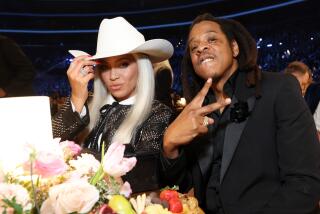Noble to Pay Record $65 Million for Houston FM Radio Station
SAN DIEGO — Noble Broadcast Group, a fast-growing radio station chain based here, said Friday that it has agreed to buy the top-rated FM station in Houston for $65 million, the largest price ever for a single U.S. radio station.
Noble’s pending acquisition of KMJQ in Houston from Keymarket Communications is one of three FM station purchases totaling $100 million that Noble’s president and sole shareholder, John Lynch, announced Friday. The San Diego company agreed to acquire KMJM of St. Louis from Keymarket for $16 million and to buy WMHE and the local Muzak franchise in Toledo, Ohio, from Osborne Communications for $19 million.
Assuming the KMJQ deal passes muster with the Federal Communications Commission, the purchase would eclipse the previous record price of $43 million paid for a radio station--Legacy Broadcasting’s acquisition of KJOI-FM in Los Angeles. The seller in that deal was Noble, which had bought the station three years earlier for $18 million.
Another radio deal, Infinity Broadcasting Corp.’s $82-million purchase of KVIL in Dallas in April, 1987, was larger, but the package included KVIL’s AM station, according to Pat Clawson, an editor with Radio & Records, a trade magazine in Los Angeles.
Houston’s KMJQ, a 100,000-watt station that has been No. 1 in its market for several years, had a 10.3% share of Houston listeners last fall, according to Arbitron ratings. Houston is the 10th-largest radio market in the country. KMJQ features an “urban contemporary” format, which is designed for black listeners but enjoys a large “crossover” from non-black audiences, Clawson said.
Lynch said Friday that he plans no changes in KMJQ personnel or format.
Noble is one of several radio chains aggressively seeking to buy radio properties, analysts said Friday. The buying interest has been stimulated by ample financing available from Wall Street and relaxed FCC regulations that now allow a single entity to own up to a total of 24 FM and AM stations, up from a maximum of 14 stations four years ago, said Ian Gilchrist, a managing director of Paine Webber of San Francisco.
Meanwhile, large media conglomerates including NBC, Metromedia and others have divested themselves of some of their “management-intensive” radio properties in recent years, increasing opportunities for entrepreneurs, media analyst Francine Blum of Wertheim Schroder said this week.
In recent years, the FCC also abolished its rule that owners had to hold radio stations for a minimum of three years before selling. As a result, the market has heated up: So far this year, 402 U.S. radio stations have changed hands in deals valued at a total of $1 billion, Clawson said.
Other factors that have elevated radio’s appeal to investors are its high cash flow, compared to television, and radio’s nearly unbroken record of growth as an advertising medium over the last 40 years, Gilchrist said. Meanwhile, television’s audiences have been reduced in many markets by cable TV.
With the acquisition of the three stations, Noble will become one of the largest independent radio chains in the country, having grown from just two outlets in 1985. Other large groups include Infinity Broadcasting, a 15-station chain based in New York, and Emmis Broadcasting, a 12-station group in Indianapolis that bought five NBC-owned stations in February for $121.5 million.
Noble, which is financing its acquisitions with loans from Prudential-Bache Securities, Toronto Dominion Bank, Bank of New England and Mutual of New York, plans to buy as many as five additional stations over the next two weeks, Lynch said.
Noble’s holdings currently include 12 stations, including XTRA FM and AM in San Diego, plus AM-FM combinations in Boston; Long Island, N.Y.; New Haven, Conn.; Denver, and Kansas City, Mo. Noble’s annual revenue exceeds $100 million, Lynch said.
More to Read
The biggest entertainment stories
Get our big stories about Hollywood, film, television, music, arts, culture and more right in your inbox as soon as they publish.
You may occasionally receive promotional content from the Los Angeles Times.










